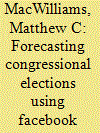| Srl | Item |
| 1 |
ID:
141821


|
|
|
|
|
| Summary/Abstract |
Facebook constantly tracks the growth of each congressional candidate’s fan base and the number of people engaging with candidates online. These Facebook metrics comprise a rich dataset that theoretically may capture the effectiveness of campaigns in building participatory support as well as their potential to mobilize support. When added to electoral fundamentals similar to those used in national-election forecasting, can Facebook data be used to develop a reliable model for predicting vote-percentage outcomes of individual congressional contests? The results of an exploratory investigation reveal that fan participation and mobilization metrics tracked by Facebook produced surprisingly accurate election predictions in the 2012 US Senate races studied. The question remains, however, whether these results are a “flash in the 2012 pan” or an indication that using Facebook statistics to measure campaign effectiveness is a new tool that scholars can use to forecast the outcome of congressional campaigns.
|
|
|
|
|
|
|
|
|
|
|
|
|
|
|
|
| 2 |
ID:
149337


|
|
|
|
|
| Summary/Abstract |
While the party decides theory explains the outcomes of past nomination battles for president, this year in the Republican presidential contest party insiders failed to anoint a standard bearer. Who decides when the party elites don’t? In 2016, it was America’s authoritarian voters. And their candidate of choice, Donald Trump, is anathema to party leaders. I argue that Trump’s rise is in part the result of authoritarian voters’ response to his unvarnished, us-versus-them rhetoric. The failure of Republican Party insiders to coalesce behind one candidate opened the door for Trump. Authoritarian-driven partisan polarization (Hetherington and Weiler 2009), increasing fear of real and imagined threats, and terrorist incidents abroad and at home provided the fuel for Trump’s campaign. And Trump’s message and manner ignited that fuel, propelling him to the Republican nomination for president.
|
|
|
|
|
|
|
|
|
|
|
|
|
|
|
|